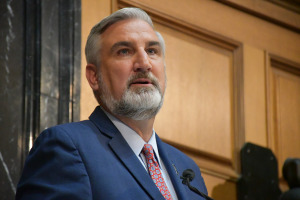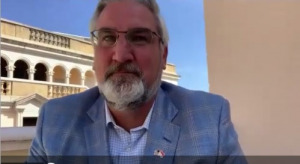
Holcomb heading to Greece on latest trade trip
Indiana Gov. Eric Holcomb is scheduled to lead a trade delegation to Athens in a trip organized by the Council of State Governments.

Indiana Gov. Eric Holcomb is scheduled to lead a trade delegation to Athens in a trip organized by the Council of State Governments.

Indiana Gov. Eric Holcomb is set to become the first U.S. governor to travel to the country since Russia’s invasion more than two years ago.

Officials say the tariffs will help thwart China’s efforts to dominate the market for emerging technologies in ways that pose risks to U.S. national security and economic stability.

IBJ talked with State Agriculture Director Don Lamb about the trade mission to Brazil, the importance of agriculture trade missions and Indiana’s import/export relationships.

Indiana’s delegation will focus on building relationships in agriculture and biosciences.

The Federal Trade Commission ruled that Intuit engaged in deceptive practices by running ads claiming consumers could file their taxes for free using TurboTax even though many people did not qualify for such free offerings.
The Kremlin says Russia will suspend the Black Sea Grain Initiative until its demands to get its own food and fertilizer to the world are met.
The expected action is the latest effort by the White House to target China’s military and technology sectors at a time of increasingly fraught relations between the world’s two biggest economies.
For years, Robinson-Patman was a mainstay of FTC enforcement. But the law fell out of favor as antitrust experts focused on consumer prices, arguing that retailer discounts would likely be passed on to consumers.
A group of major U.S. businesses wants the government to hide key import data—a move trade experts say would make it more difficult for Americans to link the products they buy to labor abuse overseas.

When the dollar is strong, a U.S.-based company that sells products overseas earns fewer dollars. On the flip side, the cost of imported goods and foreign expenses are lower.
The World Trade Organization is predicting global trade volumes will grow a lackluster 1% next year as challenges weigh on markets, including high energy prices, rising interest rates and uncertainties about Chinese manufacturing output amid the lingering COVID-19 pandemic.
House Speaker Nancy Pelosi’s visit to Taiwan, which has has enraged Beijing and Chinese nationalists, could further muddle Washington’s already complicated relationship with China as the two sides wrest with differences over trade, the war in Ukraine, human rights and more.
Before becoming a teacher, Kim Rosenbaum worked for 14 years as a welder in machine shops—experiences that she thinks make her a better teacher.

Indiana Gov. Eric Holcomb and Secretary of Commerce Brad Chambers spent this week in Sweden, the United Kingdom and Monaco meeting with world leaders and companies.
Indiana Gov. Eric Holcomb and Secretary of Commerce Brad Chambers are set to lead an economic development trip to Sweden, the United Kingdom and Monaco at the end of this month to bolster strategic relationships and highlight the state’s industries.
One of the busiest trade ports on the U.S.-Mexico border remained effectively closed Wednesday as frustration and traffic snarls mounted over orders by Texas Gov. Greg Abbott requiring extra inspections of commercial trucks.
Reports of civilians being tortured and killed in Ukraine, with streets on the outskirts of Kyiv being strewn with corpses, had some lawmakers this week questioning why the Senate had not yet taken action on the bill.
The war’s damage to the auto industry has emerged first in Europe. But U.S. production will likely suffer eventually, too, if Russian exports of metals—from palladium for catalytic converters to nickel for electric vehicle batteries—are cut off.

Indiana-based firms are struggling with how to protect their employees and their business interests in those countries while also condemning the Russian government’s actions.